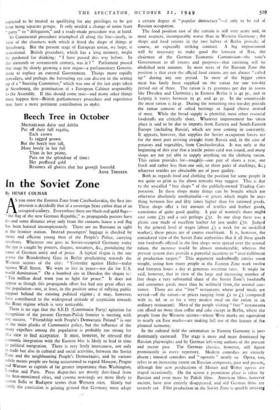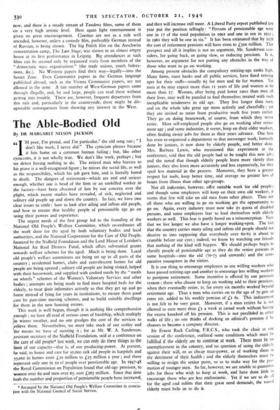In the Soviet Zone
By HENRY COLMAR
AS you enter the Eastern Zone from Czechoslovakia, the first im- pression is decidedly that of a sovereign State rather than of an occupied country. Everywhere there are black-red-gold flags— the flag of the new German Republic," as propaganda posters have it—and some distance away only from the customs house a red flag has been hoisted inconspicuously. There are no Russians in sight at the frontier station. Instead passengers' luggage is checked by smart and efficient young men of the People's Police, carrying revolvers. Wherever one goes in Soviet-occupied Germany today the eye is caught by posters, slogans, streamers, &c., postulating the cause of German unity and of peace. A typical slogan is the one across the Brandenburg Gate in Berlin proclaiming towards the Western sectors of the city: "Yesterday against Hitler—today against Wall Street. We want to live in peace—not die for U.S. world domination." On a bombed site in Dresden the slogan is: "Ten million dead want you to fight for peace." It does not appear as though this propaganda effort has had any great effect on the population—not, at least, in the positive sense of rallying public Support behind the existing political regime; it may, however, have contributed to the widespread attitude of scepticism towards the Bonn regime which is very noticeable. There is no sign that the S.E.D. (Communist Party) agitation for recognition of the present German-Polish frontier is meeting with any success. "Friendship with People's Democratic Poland" is one iii the main planks of Communist policy, but the influence of the many expellees among the population is probably too strong for this view to find acceptance. It must, however, be stressed that economic integration with the Eastern bloc is likely to lead in time to political integration. There is very lively intercourse, not only in trade but also in cultural and social activities, between the Soviet Zone and the neighbouring People's Democracies, and by various subtle means people are being accustomed to regard Moscow, Prague and Warsaw as capitals of far greater importance than Washington, London and Paris. Press dispatches are mostly date-lined from the first-mentioned cities, and cinema newsreels are more likely to screen Sofia or Budapest scenes than Western ones. Slowly but surely the conviction is gaining ground that Germany must adopt
a certain degree of "popular democracy "—if only to be rid of Russian occupation.
The food position east of the curtain is still very acute and, in most respects, incomparably worse than in Western Germany ; the shops and food rations in the two halves of Berlin provide, of course, an especially striking contrast. A big improvement will be necessary to make good the forecast of Rau, the chairman of the German Economic Commission—the zone's Government to all intents and purposes—that rationing will be abolished next autumn. In most area of the Russian Zone the position is that even the official food rations are not always "called up" during any one period. In most of the bigger cities meat has lately been supplied on the ration for one ten-day period out of three. The ration is 25 grammes per day in towns like Dresden and Chemnitz ; in Eastern Berlin it is ao gr., and in Leipzig it varies between 25 gr. and ao gr. In the countryside the meat ration is 20 gr. During the remaining two ten-day periods the ration consists of salted herrings or liquid cheese instead of meat. While the bread supply is plentiful, most other essential foodstuffs are critically short. Whatever improvement has taken place is said to be due to imports from Eastern and South-Eastern Europe (including Russia), which arc now coming in constantly. It appears, however, that supplies for Soviet occupation forces are for the most part arriving straight from Russia and, in the case of potatoes and vegetables, from Czechoslovakia. It was only at the beginning of this year that a textile points card was issued, and many shops are not yet able to supply anything on the clothing ration. This ration provides for—roughly—one pair of shoes a year, one frock and rather less than one suit, or three pairs of stockings, &c.; whatever textiles are obtainable arc of poor quality.
Both as regards food and clothing the position for some people is not quite so grim as the above remarks may suggest. This is due to the so-called "free shops" of the publicly-owned Trading Cor- poration. In these shops many things can be bought which are otherwise absolutely unobtainable—at prices which might be any- thing between five and fifty times higher than for rationed goods. These shops offer a fair amount of textiles and leather goods, sometimes of quite good quality- A pair of women's shoes mighS cost some £25 and a suit perhaps £32. In one shop there was a picnic case made of excellent leather for just under £70. judged by the general level of wages (about £5 a week for an unskilled worker), these prices are of course exorbitant. It is, however, the considered view of the Soviet Zone authorities that if all these goods and foodstuffs offered in the free shops were spread over the normal ration, the increase would be almost unnoticeable, whereas the present system does provide a powerful incentive to "over-fulfilment of production targets." This argument undoubtedly carries some weight, seeing how many people in the Eastern Zone work twelve and fourteen hours a day at generous overtime rates. It might be said, however, that in view of the large and increasing number of free shops a very substantial share of the Soviet Zone's foodstuffs and consumer goods must thus be withheld from, the normal con- sumer. There are also "free" restaurants where good meals are served—off the ration—at prices ranging from LI to £3 (compared with 2s. 6d. or so for a very modest meal on the ration in an ordinary restaurant). Most of the people visiting "free" restaurants can afford no more than coffee and cake except in Berlin, where the people from the Western sectors—whose West marks are equivalent to nearly six East marks—are making full use of this feature of the planned economy.
In the cultural field the orientation in Eastern Germany is pre- dominantly eastward. The stage is more and more dominated by Russian playwrights and by German left-wing authors of the present and recent past. The German classics, however, still figure prominently in every repertory. Modern comedies are entirely absent ; musical comedies and " operette " nearly so. Opera, too, relies to an increasing extent on Russian composers, past and present, although fine new productions of Mozart and Weber operas are staged occasionally. On the screen a prominent place is taken by Russian and even more by Polish films. American films, however ancient, have now entirely disappeared, and old German films are severely cut. Film production in the Soviet Zone is quickly reviving now, and there is a steady stream of Tendenz films, some of them on a very high artistic level. Here again light entertainment is given no great encouragement. Cinemas arc not as a rule well attended, however, unless a comedy film, preferably German instead of Russian, is being shown. The big Polish film on the Auschwitz concentration camp, The Last Stage, was shown to an almost empty house at its first performance in Leipzig. Big attendances at such films can be secured only by organised visits from members of the "democratic mass organisations" (the trade unions, youth federa- tions, &c.). No Western papers find their way—legally—into the Soviet Zone. Even Communist papers in the German language published abroad, such as the Vienna Communist papers, are not allowed in the zone. A fair number of West-German papers come through illegally, and, by and large, people can read these without getting into trouble. There arc, however, frequent departures from this rule and, particularly in the countryside, there might be dis- agreeable consequences from showing any interest in the West.



































 Previous page
Previous page